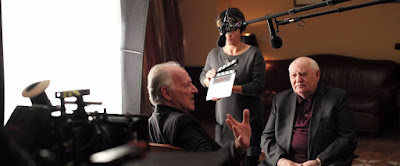Mikhail Gorbachev, former president of the Soviet Union, sits down with filmmaker Werner Herzog to discuss his many achievements. Topics include the talks to reduce nuclear weapons, the reunification of Germany and the dissolution of his country.
Meeting Gorbachev is directed by André Singer and Werner Herzog; the former, a British anthropologist and documentary-maker, the latter, a prolific German film and documentary director. Together they have compiled a love letter to Mikhail Gorbachev, the last leader of the Soviet Union before it's dissolution.
Approaching 90 in age, Meeting Gorbachev comes across as a highlight reel, looking at the achievements and accomplishments that Gorbachev has achieved in his political career. Herzog conducts most of the questioning during the interview sessions and does not attempt to hide his reverence for Gorbachev. It creates a very one-sided bias, with Herzog having such a strong, positive perception towards the subject of the documentary. While this lack of objectivity could ultimately be seen as a negative aspect of the piece, the bias is made apparent from the very start, and still has its positive elements.
Meeting Gorbachev does cover the usual documentary angles, covering his early life and upbringing, but it spends the majority of its runtime focusing on his time in the Soviet Party. Much of the focus is on what would globally be considered the big achievements of Gorbachev's reign; the denuclearization agreements between the Soviet Union and the USA, improving relations with the Western World, and the Reunification of Germany. Much time is spent on the reunification of Germany, thanks to Herzog's heritage and his own emotional connections to the event.
Herzog is potentially what prevents Meeting Gorbachev from being a much better documentary than it is. His personal connections create emotional questions that attempt to lead Gorbachev towards specific answers; something that Gorbachev avoids quite frequently. The whole interview component comes across like the president of a fan club interviewing their idol. No mentioning of any negative events (Chernobyl is barely mentioned), nothing but constant praise, and a lot of leading questions that feel overly premeditated as they lack organic flow and progression. It also forms a documentary with little in the way of narrative drive or direction.
The timing of the documentary doesn't immediately feel rightly placed. At least not until the latter half of the feature. Once Gorbachev is able to speak with more freedom about his thoughts on what he accomplished, he opens up on a lot of interesting elements around his role as the middle-man between the Soviet Union and the Western Democratic world. Meeting Gorbachev becomes a peek behind the iron curtain, highlighting how it took two rational leaders that were fully aware of how close they were to nuclear annihilation, to forge an agreement to end the arms race between the Soviets and the US. While no names are mentioned, there is a clear note of concern around the behaviour of certain world leaders currently in power, that are again proliferating their nuclear arsenals.
There is a clear, well-thought-out intelligence in Gorbachev. His ability to maintain an open mind and his clear concern for the people of his own country helped the man to run the gauntlet on many occasions, even managing to beat out a military coup thanks to his popularity. And yet, the man is still reviled by so many and considered a traitor by others. There is a clear sympathy to be had for this man who was looking to ensure that all of his people were well-fed and aiming high for world peace.
While clearly unbalanced, and narratively wavering, there are few people alive that are willing to talk about the Cold War from the perspective of the Soviet Union. While one-sided in its portrayal, and limited in its sources, it is nonetheless a humanizing perspective and an engaging one at that.
Meeting Gorbachev is in cinemas from January 23, 2020






